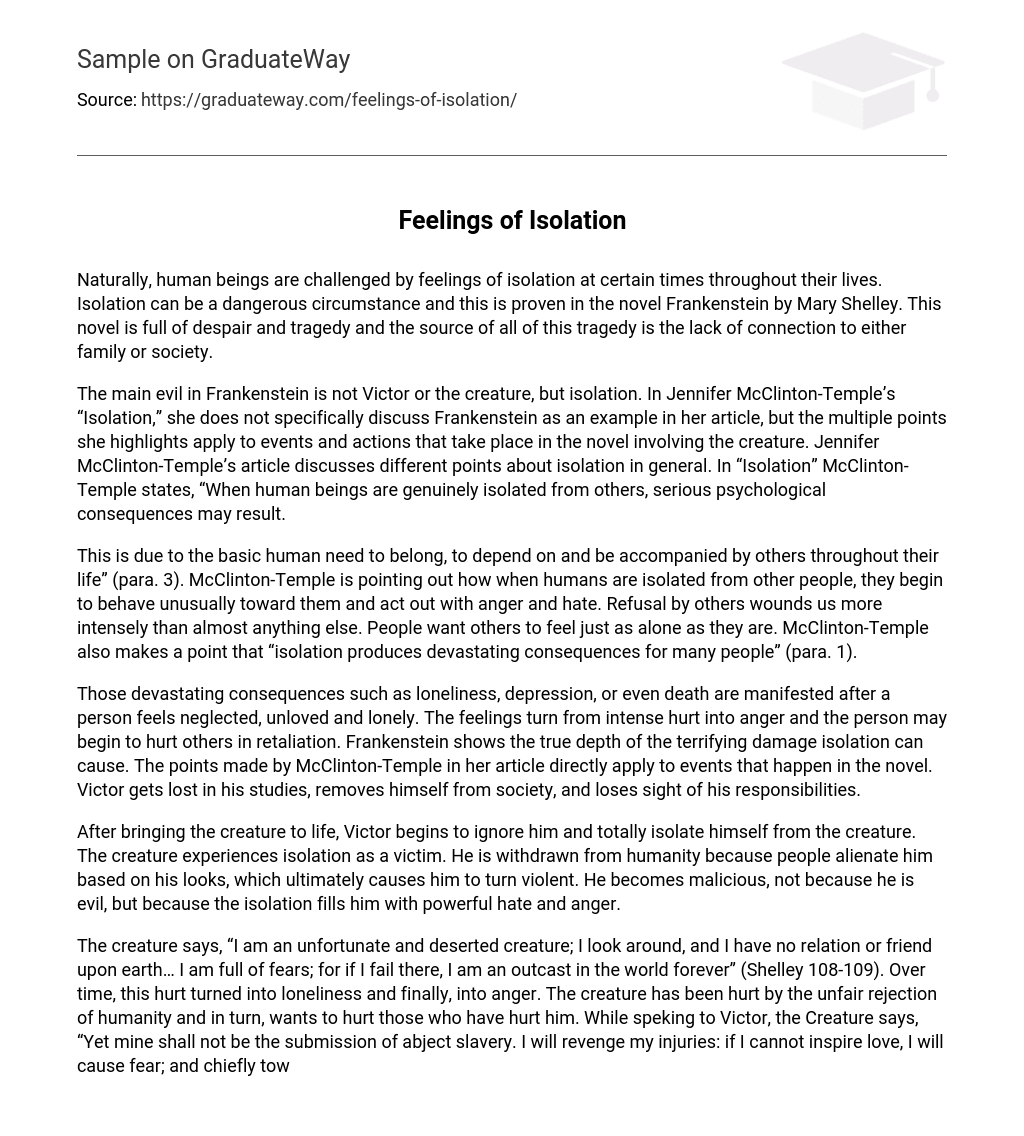Naturally, human beings are challenged by feelings of isolation at certain times throughout their lives. Isolation can be a dangerous circumstance and this is proven in the novel Frankenstein by Mary Shelley. This novel is full of despair and tragedy and the source of all of this tragedy is the lack of connection to either family or society.
The main evil in Frankenstein is not Victor or the creature, but isolation. In Jennifer McClinton-Temple’s “Isolation,” she does not specifically discuss Frankenstein as an example in her article, but the multiple points she highlights apply to events and actions that take place in the novel involving the creature. Jennifer McClinton-Temple’s article discusses different points about isolation in general. In “Isolation” McClinton-Temple states, “When human beings are genuinely isolated from others, serious psychological consequences may result.
This is due to the basic human need to belong, to depend on and be accompanied by others throughout their life” (para. 3). McClinton-Temple is pointing out how when humans are isolated from other people, they begin to behave unusually toward them and act out with anger and hate. Refusal by others wounds us more intensely than almost anything else. People want others to feel just as alone as they are. McClinton-Temple also makes a point that “isolation produces devastating consequences for many people” (para. 1).
Those devastating consequences such as loneliness, depression, or even death are manifested after a person feels neglected, unloved and lonely. The feelings turn from intense hurt into anger and the person may begin to hurt others in retaliation. Frankenstein shows the true depth of the terrifying damage isolation can cause. The points made by McClinton-Temple in her article directly apply to events that happen in the novel. Victor gets lost in his studies, removes himself from society, and loses sight of his responsibilities.
After bringing the creature to life, Victor begins to ignore him and totally isolate himself from the creature. The creature experiences isolation as a victim. He is withdrawn from humanity because people alienate him based on his looks, which ultimately causes him to turn violent. He becomes malicious, not because he is evil, but because the isolation fills him with powerful hate and anger.
The creature says, “I am an unfortunate and deserted creature; I look around, and I have no relation or friend upon earth… I am full of fears; for if I fail there, I am an outcast in the world forever” (Shelley 108-109). Over time, this hurt turned into loneliness and finally, into anger. The creature has been hurt by the unfair rejection of humanity and in turn, wants to hurt those who have hurt him. While speking to Victor, the Creature says, “Yet mine shall not be the submission of abject slavery. I will revenge my injuries: if I cannot inspire love, I will cause fear; and chiefly towards you my arch-enemy, because my creator, do I swear inextinguishable hatred.
Have a care: I will work at your destruction, nor finish until I desolate your heart, so that you shall curse the hour of your birth’ (Shelly 119). The Creature wants to make Victor feel as isolated as it does, destroy him, and take away all of his happiness in order to gain vengeance on isolating him. It becomes clear in Frankenstein and in McClinton-Temple’s article how isolation from both family and society is the worst possible fate and the reason for hatred and violence.
It is important to realize that this connection to other humans is our greatest source of comfort. We cannot function as well as humans because, in isolation, there is no direct access to those who love you or give you that form of connection one needs to survive. It limits a person from the social interactions that can be useful throughout their lifetime.





